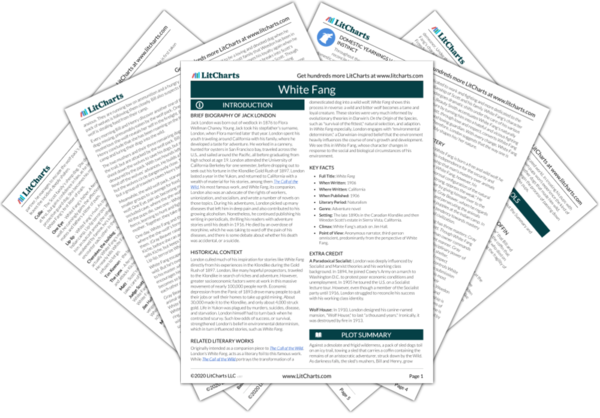Summary
Analysis
Recovered from the attack, the cub ventures out of the cave and sees man for the first time. A group of Indians is silently sitting in a clearing. Counter to his instincts, he does not run away, but regards the men with "awe."
White Fang's wild instincts tell him to run from man, but the fact that he is spellbound by the sight of the men suggests that he also has an inherent attraction to them and their natural mastery. This attraction may come from the fact that he inherits at least some domesticity from his half-wolf mother.
Themes
An Indian approaches him, lowering his hand to touch the cub's head. The cub cannot decide whether "to yield," or "to fight," so he bares his teeth and bites the man's hand, revealing his white fangs. The man gives him a few clouts to the head, causing the cub to ki-yi, or yelp. The Indians laugh at his wailing, but the cub's cry summons the she-wolf to his aid.
White Fang's uncertainty "to fight," or "yield" to man expresses the conflict between domestic yearnings and natural instincts. Instinct tells him to fight, but respect orders him to yield. White Fang's natural response shows that instinct still reigns, yet the Indians show natural mastery over him.
Themes
The she-wolf defensively stands over her pup, but wilts into submission at the sound of her name, "Kiche!" The Indian, who calls her name, Gray Beaver, recognizes the she-wolf as his brother's dog, a half wolf, half dog, who ran away to the wild during a famine a year before. He claims her and her cub, whom he names White Fang, as his own by tying them down with a stick and leather thong.
By calling the she-wolf's name Gray Beaver demonstrates man's mastery over dog; he seems to remind the she-wolf of her former domesticity. He then further emphasizes his mastery both by tying Kiche and White Fang down and by giving White Fang a name. Yet Kiche's history shows that the line between man's world and the natural environment is thin and flexible.
Themes
Gray Beaver rubs White Fang's tummy, causing him to submit to his master's touch. At first afraid, he enjoys the affection and feeling of "fearless companionship."
Gray Beaver reinforces his mastery by showing affection and companionship towards White Fang. White Fang's enjoyment of this gesture shows that he is amenable to man's mastery.
Themes
Get the entire White Fang LitChart as a printable PDF.

The other dogs attempt to attack White Fang and his mother, but the Indian men drive them away with their yells and their clubs. This show of power impresses White Fang, causing him to regard men as "gods."
The club is a symbol of man's violent authority. That White Fang regards men as "gods" underlines the devotional and worshipful quality of his reverence for man, as well as his awe for anything that is powerful—which men, with their clubs, are.
Themes
Literary Devices
Gray Beaver takes White Fang and Kiche to the Indian camp, where White Fang meets Lip-lip, a fierce fighting puppy, who snarls and nips at the newcomer. They are enemies from the start.
White Fang's rivalry with Lip-lip represents a struggle for not just life, but also dominance, power, and mastery over other animals.
Themes
White Fang watches Gray Beaver make fire for the first time. Amazed, White Fang approaches it, but burns his nose and tongue on the flames. The Indians' laughter at his yelps of pain humiliates him. Yet he still regards their mastery over life and lifeless things, such as fire, to be "gods."
From the fire, White Fang quickly learns that life can be painful and humiliating, but he also feels man's power over matter and life. This reaffirms White Fang's belief that men are gods to be adored.
Themes
Literary Devices












